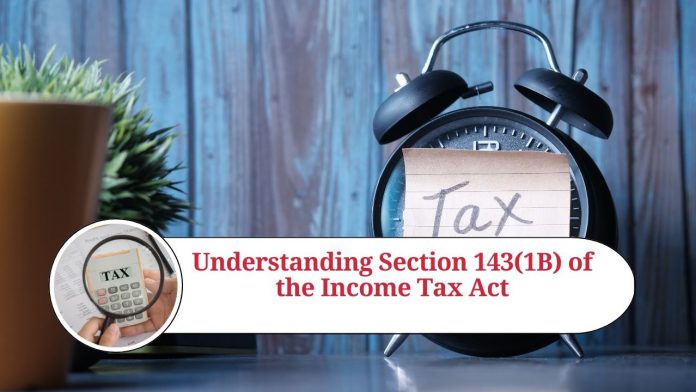Section 143(1B) is a relatively new provision added to the Income Tax Act, 1961. It was introduced by the Finance Act, 2016 and has been applicable from the Assessment Year 2017-18 onwards. The provision mandates taxpayers to provide details of the cash deposits made during the demonetization period, i.e., November 9, 2016, to December 30, 2016. In this blog, we will take a closer look at Section 143(1B) and understand its implications.
What is Section 143(1B)?
Section 143(1B) of the Income Tax Act requires taxpayers to provide details of any cash deposits made during the demonetization period. This provision was introduced to enable the Income Tax Department to verify the source of such cash deposits and to prevent tax evasion. The provision applies to all taxpayers, including individuals, HUFs, firms, companies, and others.
What are the details required to be provided?
Taxpayers are required to provide the following details related to cash deposits made during the demonetization period:
- Date of deposit
- Name of the bank where the deposit was made
- Amount of deposit
- PAN or Aadhaar number of the depositor
Taxpayers can provide these details while filing their income tax returns for the relevant assessment year. It is important to note that failure to provide these details or providing incorrect details can result in penalties and legal consequences.
What happens if the details are not provided?
If a taxpayer fails to provide the required details, the Income Tax Department may issue a notice asking for an explanation. If the department is not satisfied with the explanation provided, it can initiate penalty proceedings under Section 271F of the Income Tax Act. The penalty for non-compliance is Rs. 5,000.
What are the implications of Section 143(1B)?
Section 143(1B) is a crucial provision that enables the Income Tax Department to keep a check on tax evasion. By requiring taxpayers to provide details of cash deposits made during the demonetization period, the department can verify the source of such deposits and take appropriate action in case of any discrepancies.
It is important for taxpayers to comply with the provisions of Section 143(1B) and provide accurate details of their cash deposits. Failure to do so can result in penalties and legal consequences.
Conclusion
Section 143(1B) of the Income Tax Act is a provision that requires taxpayers to provide details of their cash deposits made during the demonetization period. The provision is aimed at preventing tax evasion and ensuring compliance with tax laws. Taxpayers must provide accurate details of their cash deposits to avoid penalties and legal consequences.
Read more useful content:
- section 234e of income tax act
- section 286 of income tax act
- section 90a of income tax act
- section 40a(7) of income tax act
- section 226(3) of income tax act
- section 24 of income tax act
Frequently Asked Questions (FAQs)
Q. What is Section 143(1B) of the Income Tax Act?
Section 143(1B) of the Income Tax Act is a provision that requires taxpayers to provide details of cash deposits made during the demonetization period, i.e., November 9, 2016, to December 30, 2016.
Q. Who is required to provide details under Section 143(1B)?
All taxpayers, including individuals, HUFs, firms, companies, and others, who made cash deposits during the demonetization period are required to provide details under Section 143(1B).
Q. What details are required to be provided under Section 143(1B)?
Taxpayers are required to provide details such as the date of deposit, name of the bank where the deposit was made, amount of deposit, and PAN or Aadhaar number of the depositor.
Q. When should taxpayers provide the details under Section 143(1B)?
Taxpayers can provide the details while filing their income tax returns for the relevant assessment year.
Q. What happens if the required details are not provided under Section 143(1B)?
If a taxpayer fails to provide the required details, the Income Tax Department may issue a notice asking for an explanation. If the department is not satisfied with the explanation provided, it can initiate penalty proceedings under Section 271F of the Income Tax Act. The penalty for non-compliance is Rs. 5,000.
Q. What is the objective of Section 143(1B)?
The objective of Section 143(1B) is to prevent tax evasion and ensure compliance with tax laws. By requiring taxpayers to provide details of cash deposits made during the demonetization period, the Income Tax Department can verify the source of such deposits and take appropriate action in case of any discrepancies.
Q. Is it mandatory to provide details under Section 143(1B)?
Yes, it is mandatory to provide details of cash deposits made during the demonetization period under Section 143(1B).
Q. Can the details provided under Section 143(1B) be used for any other purpose?
No, the details provided under Section 143(1B) can only be used for the purpose of verifying the source of cash deposits made during the demonetization period.
Q. Can taxpayers revise the details provided under Section 143(1B)?
Yes, taxpayers can revise the details provided under Section 143(1B) before the completion of the assessment year.
Q. Is there any deadline for providing details under Section 143(1B)?
There is no specific deadline for providing details under Section 143(1B), but taxpayers should provide the details while filing their income tax returns for the relevant assessment year to avoid penalties and legal consequences.




















